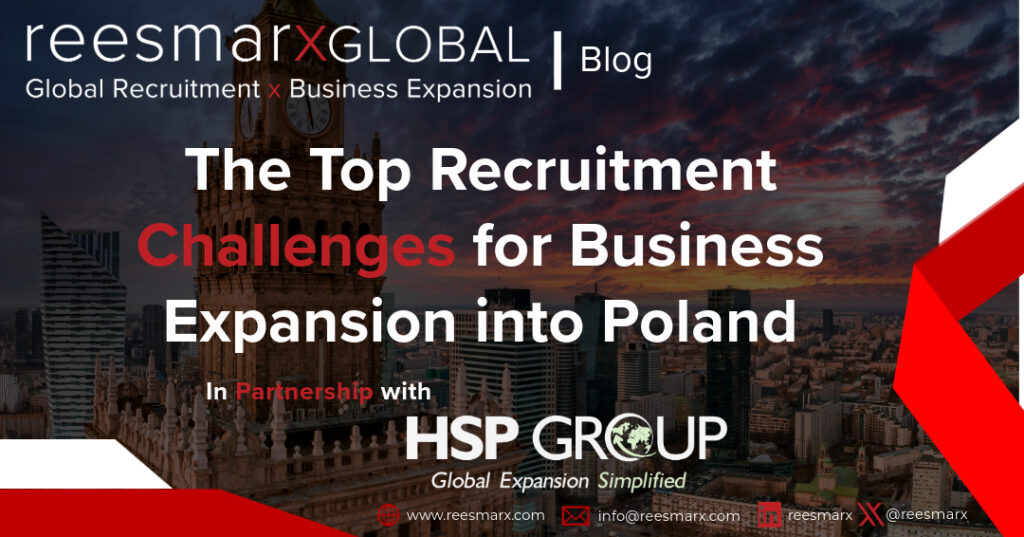Continuing our series with our partners at HSP Global, our next country of focus is Poland. Expanding your business into Poland offers immense opportunities, thanks to its thriving economy, strategic location in Europe, and highly skilled workforce. However, as with any market, it presents unique recruitment challenges that can impact the success of your expansion. Understanding and addressing these challenges is essential to building a strong team and establishing a foothold in this dynamic market.
Here are the most significant recruitment and HR challenges companies face when expanding into Poland:

RECRUITMENT
Talent Shortages in Key Sectors
Poland’s rapid growth in industries such as IT, engineering, and manufacturing has created a high demand for skilled professionals. However, the talent supply often struggles to keep pace. Employers face stiff competition when hiring for specialized roles, particularly in:
- Tech: Software developers, AI specialists, and cybersecurity experts are in short supply.
- Engineering: High demand in the automotive, aerospace, and construction sectors strains the availability of experienced professionals.
- Healthcare: Medical professionals, including nurses and doctors, are also increasingly sought after.
Intense Competition for Top Talent
Global companies, regional businesses, and startups alike compete for the same talent pool, especially in urban hubs like Warsaw, Kraków, and Wrocław. This competition drives up wages and requires businesses to offer attractive compensation packages, career development opportunities, and flexible working arrangements to stand out.
Regional Disparities in Talent Availability
While major cities offer a deep talent pool, rural areas often lack the same level of access to skilled workers. Companies expanding into less-populated regions may need to provide relocation assistance or implement creative sourcing strategies to attract talent.
Navigating Language and Cultural Barriers
While many professionals in Poland, especially younger generations, speak English fluently, language can still be a barrier depending on the role and region. Additionally, understanding the local work culture—which emphasizes structure, professionalism, and hierarchy—is critical for successful recruitment and integration of employees into your organization.
Building Employer Brand Awareness
A strong employer brand is vital in Poland’s candidate-driven market. New entrants face the challenge of establishing themselves as desirable employers. Polish candidates value:
- Transparent communication during the hiring process.
- Competitive salaries and benefits.
- Clear opportunities for career growth.
- Investing in employer branding—through social media, local job boards like Pracuj.pl, and partnerships with staffing agencies—can significantly enhance your recruitment efforts
Adapting to Changing Candidate Expectations
The pandemic accelerated shifts in workplace expectations, and Polish professionals are no exception. Many candidates now prioritize:
- Remote Work Options: Flexible arrangements are increasingly viewed as essential, especially in the tech and creative sectors.
- Work-Life Balance: Polish professionals place high value on maintaining a healthy balance between personal and professional life.
- Professional Development: Opportunities for learning and growth are critical in attracting and retaining top talent.
Retention Challenges
Retaining talent can be just as challenging as recruiting it. High-performing employees often have ample opportunities to move within Poland’s competitive job market or even seek international roles. Retention strategies should include:
- Career progression plans.
- Competitive salaries and benefits.
- A positive workplace culture.
Cost Pressures in Recruitment
Rising wages in competitive sectors like IT and finance can strain budgets. Additionally, companies need to offer compelling benefits packages, including healthcare, performance bonuses, and training programs, to attract top-tier talent.
Finding Local Expertise
Understanding the nuances of the Polish recruitment market is critical. Local expertise is invaluable for:
- Accessing hidden talent pools.
- Navigating employment regulations.
- Crafting culturally relevant job postings and employer branding campaigns.
Partnering with a recruitment firm like reesmarxGLOBAL can help businesses overcome these hurdles by providing in-depth market knowledge and tailored solutions.
HR AND LEGAL
Hiring and managing employees in Poland requires navigating through a clear legal framework. The legislation imposes minimum standards and mandatory employer obligations that must be adhered to. Understanding these laws is essential for maintaining compliance and fostering a positive work environment. This document provides a very high-level summary of the main legal and compliance aspects that must be considered when hiring employees in Poland.
Compliance with Employment Laws
Poland’s labor market is highly regulated, and businesses must ensure full compliance with local employment laws. Key considerations include:
- Employment Contracts: Polish labor law mandates written contracts specifying detailed terms of employment.
- Tax and Social Security: Employers must navigate complex tax regulations and contribute to social security on behalf of employees.
- Work Permits: Hiring non-EU workers requires navigating a rigorous process for obtaining work permits and visas.
Failing to adhere to these regulations can result in legal and financial penalties, making it crucial to have local expertise or reliable recruitment partners.
Main Types of Employment Contracts
Indefinite Period: Ongoing employment with no specified end date, offering full employment rights.
Definite Period (Fixed-Term): Employment for a specific period. Fixed-term employment contracts cannot exceed 33 months.
Trial Period: A trial period of no more than 3 months may be conducted before an employment agreement is put in place.
Civil Law Contract: Freelance agreement, service agreement or consultancy agreements where the person working does not have the employee rights included in the Polish Labor Code.
Leave Entitlements:
Annual Leave: Full time employees with less than 10 years of employment are entitled to 20 days of paid leave per year. Employees with more than 10 years of employment are entitled to 26 days of paid leave per year.
Maternity Leave: Depending on the number of children born or adopted, maternity leave ranges from 20 weeks (for the birth or adoption of one child) up to 37 weeks (for the birth or adoption of 5 or more children). A minimum of 14 weeks maternity leave must be taken before returning to work.
Paternity Leave: Up to 2 weeks of paid leave for eligible fathers or partners, until the child is 2 years old. Any untaken maternity leave beyond 14 weeks can be used by the child’s fathe
Social Security Contributions
The social security system is divided into separate insurance funds:
- Pension and disability insurance
- Sickness and maternity insurance
- Work injury and occupational disease insurance
Contributions: Employers and employees jointly finance the social security system.
Pension Contributions: The pension system is based on a defined contribution that link the amounts of future pensions to the sum of contributions paid to an employee’s account during employment. The employer and employee each pay 9.76% to finance the pension system.
In addition to social security benefits, there are mandatory benefits that employers must provide and common supplementary benefits which can vary depending on the industry.
Labor Relations
Employees have the right to join unions as well as not to participate in them.
Trade unions operate at a company level with the members employed in the same company.
A company trade union can only be formed by 10 or more employees and must be formed without the company’s participation.
The union organization must be fully registered in the National Court Register for the company to recognize the union as the employee representative body.
If the trade union meets the legal requirements to qualify as a trade union, the company must respect a trade union’s rights and privileges.

Final Thoughts
Recruiting in Poland requires a strategic approach that addresses local challenges while leveraging global best practices. By understanding the specific hurdles—from talent shortages to cultural nuances—companies can better position themselves to attract and retain top talent.
With careful planning and the right recruitment partners, your business can successfully navigate these challenges and build a team that drives your expansion in Poland forward. Avoid mistakes, contact reesmarxGlobal and HSP Group for your global expansion needs.
A significant point for employers is the 13th-month salary, or “aguinaldo,” a mandatory bonus paid in December that helps cover holiday expenses. This detail, familiar to those who regularly recruit in Costa Rica, may be overlooked by companies expanding into the region for the first time. By approaching recruitment strategically and with awareness of cultural and legal factors, businesses can attract and retain top talent while building a robust employer brand in the Costa Rican market.
The HSP Group & reesmarxGLOBAL partnership

HSP Group and reesmarxGLOBAL have established a strong partnership, effectively supporting clients in their expansion into new regions. HSP Group specializes in employment, HR, and payroll management, while reesmarxGLOBAL focuses on talent acquisition and headhunting. The synergy between recruitment firms and employment solution providers is often overlooked, yet it is crucial for several reasons.
One significant advantage is the enhanced transparency in processes and communication. As clients venture into unfamiliar territories, they may not know the right questions to ask or the obstacles they might face. By collaborating closely, these two types of firms can proactively identify potential challenges and opportunities, ensuring a smoother transition and a more informed approach long before clients arrive in their new markets.






